We will stay firmly rooted in Chinese culture. We will collect and refine the defining symbols and best elements of Chinese culture and showcase them to the world. We will accelerate the development of China’s discourse and narrative systems, better tell China’s stories, make China’s voice heard, and present a China that is credible, appealing, and respectable.
习近平会见德国总理朔尔茨
发布时间:2024-04-17 08:36:56 | 来源:新华社 | 作者: | 责任编辑:丁素云新华社北京4月16日电(记者杨依军)4月16日上午,国家主席习近平在北京钓鱼台国宾馆会见德国总理朔尔茨。
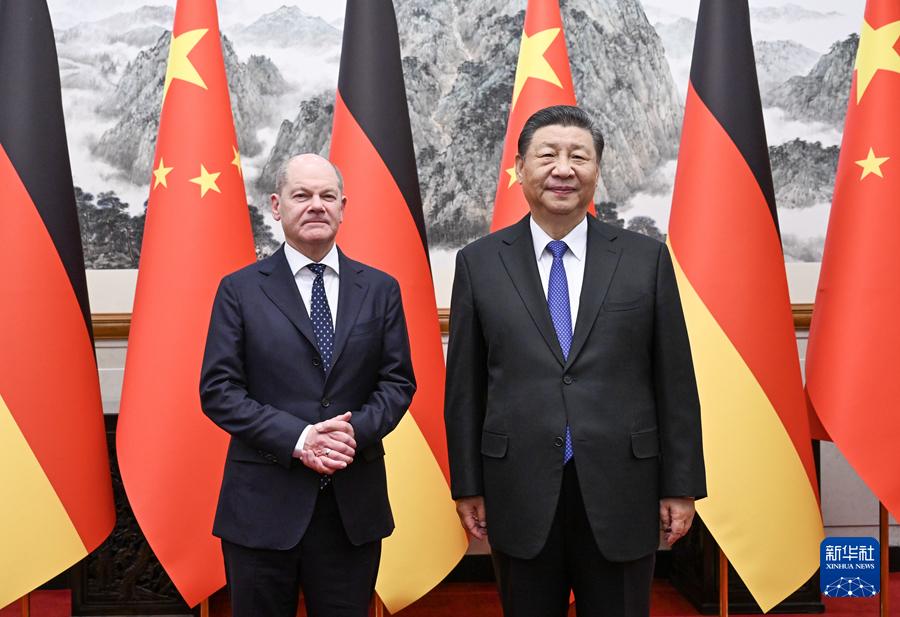
4月16日上午,国家主席习近平在北京钓鱼台国宾馆会见德国总理朔尔茨。新华社记者 谢环驰 摄
习近平指出,今年是中德建立全方位战略伙伴关系10周年。10年来,尽管国际形势发生很大变化,但中德关系始终稳健发展,各领域合作不断巩固和深化,为两国各自发展提供了动力。当前,世界百年变局加速演进,人类社会面临的风险挑战增多,要解决这些问题,离不开大国合作。中德是世界第二、第三大经济体,巩固和发展中德关系的意义超越双边关系范畴,对亚欧大陆乃至整个世界都有重要影响。两国要从长远和战略角度看待和发展双边关系,携手为世界注入更多稳定性和确定性。
习近平强调,中德两国都曾为人类文明进步作出重大贡献。中德之间没有根本利益冲突,彼此不构成安全威胁。中德合作对双方有利,对世界有利。世界越是动荡,双方越要提升两国关系的韧性和活力,坚持中德关系的合作主基调和发展大方向,牢牢把握中德是全方位战略伙伴这一定位。中国对德政策保持高度稳定性和连贯性。双方应该继续以开放的胸襟密切交往,增进战略互信。只要双方坚持相互尊重、求同存异、交流互鉴、合作共赢,两国关系必将继续行稳致远。
习近平指出,中德产业链供应链深度互嵌,两国市场高度依存。中德互利合作不是“风险”,而是双方关系稳定的保障、开创未来的机遇。无论是机械制造、汽车等传统领域,还是绿色转型、数字化、人工智能等新兴领域,两国都有合作共赢的巨大潜力亟待挖掘。双方应该发扬互利共赢的鲜明特色,彼此成就。中国出口电动汽车、锂电池、光伏产品等,不仅丰富了全球供给,缓解了全球通胀压力,也为全球应对气候变化和绿色低碳转型作出巨大贡献。中德两国都是以实业立国,都支持自由贸易和经济全球化。双方要警惕保护主义抬头,坚持以市场眼光和全球视野,从经济规律出发,客观、辩证看待产能问题,多探讨合作。中国坚持对外开放基本国策,希望德方为中国企业赴德发展提供公平、透明、开放、非歧视的营商环境。中德在世界多极化问题上有不少共通之处。多极化本质上应该是不同文明、不同制度、不同道路的国家之间相互尊重、和平共处。中德应该独立自主开展多边领域协作,推动国际社会用实际行动更好应对气候变化、发展不平衡、地区冲突等全球性挑战,为世界的平衡稳定作出更多贡献。

4月16日上午,国家主席习近平在北京钓鱼台国宾馆会见德国总理朔尔茨。新华社记者 丁海涛 摄
朔尔茨表示,当前,德中关系发展良好,双方各层级、各领域交往密切。双方成功举行了两国政府磋商以及战略、财金等领域高级别对话,还将举行气候变化和绿色转型对话。过去两天,我和德国企业界代表参访了重庆、上海等地,亲身感受到中国经济发展近年来取得的巨大成就,对德中两国企业界的紧密良好合作印象深刻。德方愿同中方继续加强两国关系,深化各领域双边对话与合作,推进教育、文化等领域人文交流,这对德中两国以及世界都至关重要。德方愿同中方加强沟通协调,共同应对气候变化等全球挑战,致力于维护多边国际秩序,促进世界和平与发展,不赞同对立对抗。德方反对保护主义,支持自由贸易。作为欧盟重要成员,德国愿为促进欧盟同中国关系良好发展发挥积极作用。
两国领导人还就乌克兰危机深入交换意见,表示中德都致力于遵守联合国宪章宗旨和原则,反对使用核武器或攻击和平核设施,妥善解决国际粮食安全问题,遵守国际人道主义法。
习近平强调,当前形势下,为防止冲突螺旋式升级甚至走向失控,各方应共同致力于早日恢复和平。为此,应该把握以下几个原则:一要以和平稳定的大局为重,不要谋求一己私利。二要为局势降温,不要拱火浇油。三要为恢复和平积累条件,不要进一步激化矛盾。四要减少对世界经济的负面影响,不要破坏全球产业链供应链稳定。中方不是乌克兰危机的当事方、参与方,但一直在以自己的方式劝和促谈。中方鼓励和支持一切有利于和平解决危机的努力,支持适时召开俄乌双方认可、各方平等参与、对所有和平方案进行公平讨论的国际和会,愿就此同包括德国在内的有关各方保持密切沟通。
双方还就巴以冲突等共同关心的国际和地区问题交换了意见。双方都认为,应落实联合国安理会第2728号决议,防止事态扩大,避免局势进一步恶化,保证加沙地带无障碍、可持续的人道主义准入,支持巴勒斯坦问题在“两国方案”基础上早日通过谈判解决,呼吁有影响力的国家为维护地区和平稳定发挥建设性作用,推动巴勒斯坦问题早日得到全面、公正、持久解决。

4月16日上午,国家主席习近平在北京钓鱼台国宾馆会见德国总理朔尔茨。这是习近平同朔尔茨一起散步。新华社记者 丁海涛 摄
会见后,习近平同朔尔茨一起散步并共进午餐,就广泛议题进一步深入交流。

4月16日上午,国家主席习近平在北京钓鱼台国宾馆会见德国总理朔尔茨。这是习近平同朔尔茨合影。新华社记者 谢环驰 摄
王毅参加会见。
Xi meets German chancellor, calls for achieving mutual success
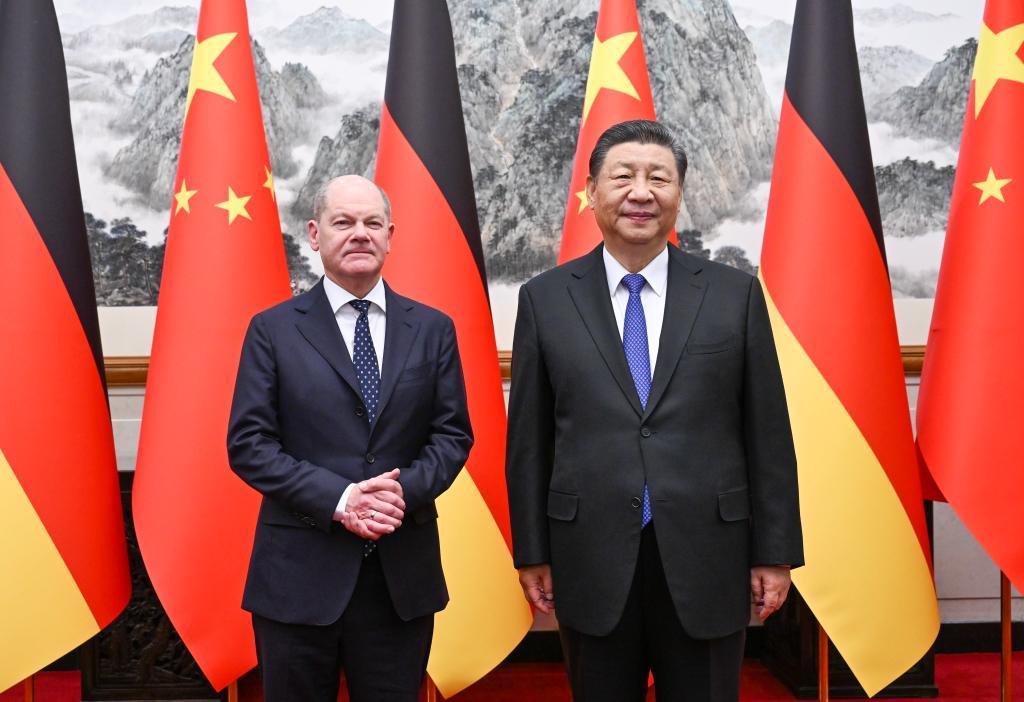
Chinese President Xi Jinping meets with German Chancellor Olaf Scholz at the Diaoyutai State Guesthouse in Beijing, capital of China, April 16, 2024. (Xinhua/Xie Huanchi)
BEIJING, April 16 (Xinhua) -- Chinese President Xi Jinping met with German Chancellor Olaf Scholz on Tuesday at the Diaoyutai State Guesthouse in Beijing, calling on the two sides to carry forward the distinctive characteristics of mutual benefit and win-win outcomes and achieve mutual success.
Noting that this year marks the 10th anniversary of the establishment of the all-round strategic partnership between China and Germany, Xi said over the past 10 years, despite tremendous changes in the international landscape, China-Germany relations have maintained steady growth, and bilateral cooperation has strengthened and deepened across the board, providing impetus for the development of both countries.
Currently, transformation not seen in a century is accelerating across the globe, and humanity faces growing risks and challenges. These problems can not be resolved without major-country cooperation, Xi said.
As China and Germany are respectively the second and third largest economies in the world, the consolidation and development of their relations carries significance that goes beyond the bilateral scope, and has a major impact on the Eurasian continent and the entire world, Xi said, calling on the two countries to view and develop bilateral relations from a long-term and strategic perspective, and work together to inject greater stability and certainty into the world.
He underscored that both China and Germany have made major contribution to the progress of human civilization. The two countries do not have clashing fundamental interests between them and pose no security threat to each other. Cooperation between China and Germany benefits not just the two sides but also the world at large.
The more instability in the world, the greater the need for the two sides to strengthen the resilience and vitality of their relations, Xi said, calling for joint efforts to keep to the overall direction of cooperation and development in growing bilateral ties, and stick to the characterization of all-round strategic partnership.
China's policy toward Germany is highly stable and consistent, Xi said, noting that the two sides need to continue engaging in close exchanges with an open mind and enhance strategic mutual trust. As long as the two sides uphold mutual respect, seek common ground while reserving differences, enhance exchanges and mutual learning, and pursue win-win cooperation, China-Germany relations will continue to enjoy solid and sustained progress.
Xi noted that the industrial and supply chains of China and Germany are deeply intertwined, and that the markets of the two countries are highly interdependent. Mutually beneficial cooperation between China and Germany is not a "risk," but the guarantee for a stable bilateral relationship and an opportunity for the future.
There is huge potential to be tapped for pursuing win-win cooperation in both traditional sectors such as machinery and automobile, and new areas such as green transition, digitization and artificial intelligence, Xi said.
It is important for the two sides to promote the win-win features of their relations and enable each other to succeed, Xi said, adding that China's export of electric vehicles, lithium batteries and photovoltaic products has not only enriched global supply and eased global inflationary pressure, but also made important contribution to the global response to climate change and the green and low-carbon transition.
Noting that both China and Germany are countries built on industries, and both support free trade and economic globalization, Xi said it is important for the two countries to stay vigilant against the rise of protectionism, adopt an objective and dialectical view on the issue of production capacity through a market and global perspective and based on the laws of economics, and devote more efforts to the discussion on cooperation.
China is committed to the basic national policy of opening up, and hopes that the German side can provide a fair, transparent, open and non-discriminatory business environment for Chinese enterprises in Germany, Xi said.
Underscoring that China and Germany share a lot in common on the issue of world multipolarity, Xi pointed out that a multipolar world is, in essence, one where countries with different civilizations, systems and paths respect each other and coexist in peace.
He said China and Germany need to independently carry out collaboration on multilateral fronts, push the international community to take real actions to better address global challenges such as climate change, unbalanced development and regional conflicts, and make greater contribution to the balance and stability of the world.
For his part, Scholz noted that Germany-China relations are now in good shape. The two countries have had close exchanges at all levels and in all fields. The two sides successfully held the intergovernmental consultation and high-level dialogues on strategic and financial issues, and will hold a dialogue on climate change and green transition.
In the past two days, he visited Chongqing and Shanghai together with representatives of the German business community, and witnessed the great economic progress China made over recent years, Scholz said. He added he was particularly impressed by the close and sound cooperation between German and Chinese businesses.
Going forward, the German side will work with the Chinese side to strengthen bilateral ties, deepen dialogue and cooperation in all fields, and promote people-to-people exchanges in such areas as education and culture, which is important for both countries and the world at large, he said.
The German side stands ready to enhance communication and coordination with the Chinese side to jointly tackle climate change and other global challenges, commits to upholding the multilateral international order and promoting world peace and development, and disapproves of conflict and confrontation, Scholz said, adding that Germany opposes protectionism and supports free trade.
As an important member of the European Union, Germany is ready to play a positive role in promoting the sound development of EU-China relations, Scholz said.
The two leaders also had an in-depth exchange of views on the Ukraine crisis, noting that both China and Germany stand committed to the purposes and principles of the UN Charter, oppose the use of nuclear weapons or attack on peaceful nuclear facilities, and call for efforts to properly address the issue of global food security and observe the international humanitarian law.
Xi underscored that under the current circumstances, all parties should commit to an early restoration of peace to prevent the conflict from escalating and even spiraling out of control.
To this end, a number of principles should be followed: first, focusing on the overall interest of peace and stability rather than seeking selfish gains; second, cooling down the situation rather than adding fuel to the fire; third, accumulating conditions for restoring peace rather than further aggravating tensions; and fourth, reducing the negative impact on the world economy rather than undermining the stability of global industrial and supply chains.
China is not a party to the Ukraine crisis, but has consistently promoted talks for peace in its own way, Xi said, China encourages and supports all efforts that are conducive to the peaceful resolution of the crisis, and supports the holding in due course of an international peace conference that is recognized by both Russia and Ukraine and ensures the equal participation of all parties and fair discussions on all peace plans.
China will maintain close communication with all parties concerned, including Germany, on this matter, Xi said.
The two sides also exchanged views on the Palestinian-Israeli conflict and other international and regional issues of mutual interest. The two sides shared the view that it is important to implement UNSC Resolution 2728, prevent escalation and further deterioration of the situation, ensure unhindered and sustained humanitarian access to Gaza, support the early settlement of the Palestinian question through negotiations on the basis of the two-State solution, and call on countries with influence to play a constructive role in maintaining regional peace and stability, with a view to achieving a comprehensive, just and lasting solution to the question of Palestine at an early date.
Following the meeting, Xi and Scholz took a walk and had lunch together, during which they further exchanged views on a wide range of issues.
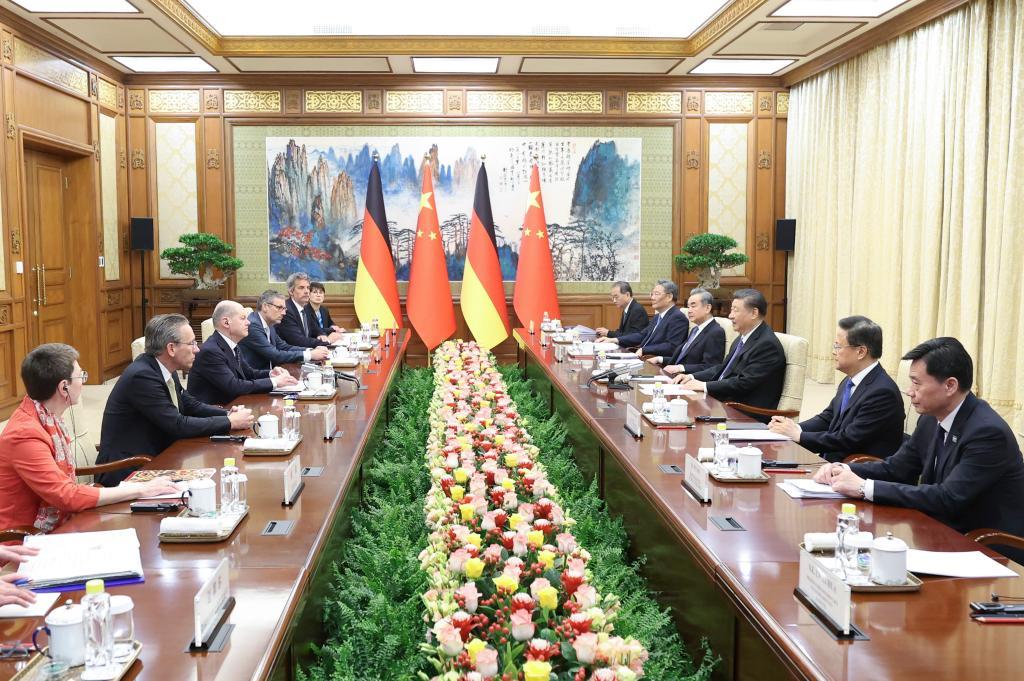
Chinese President Xi Jinping meets with German Chancellor Olaf Scholz at the Diaoyutai State Guesthouse in Beijing, capital of China, April 16, 2024. (Xinhua/Ding Haitao)
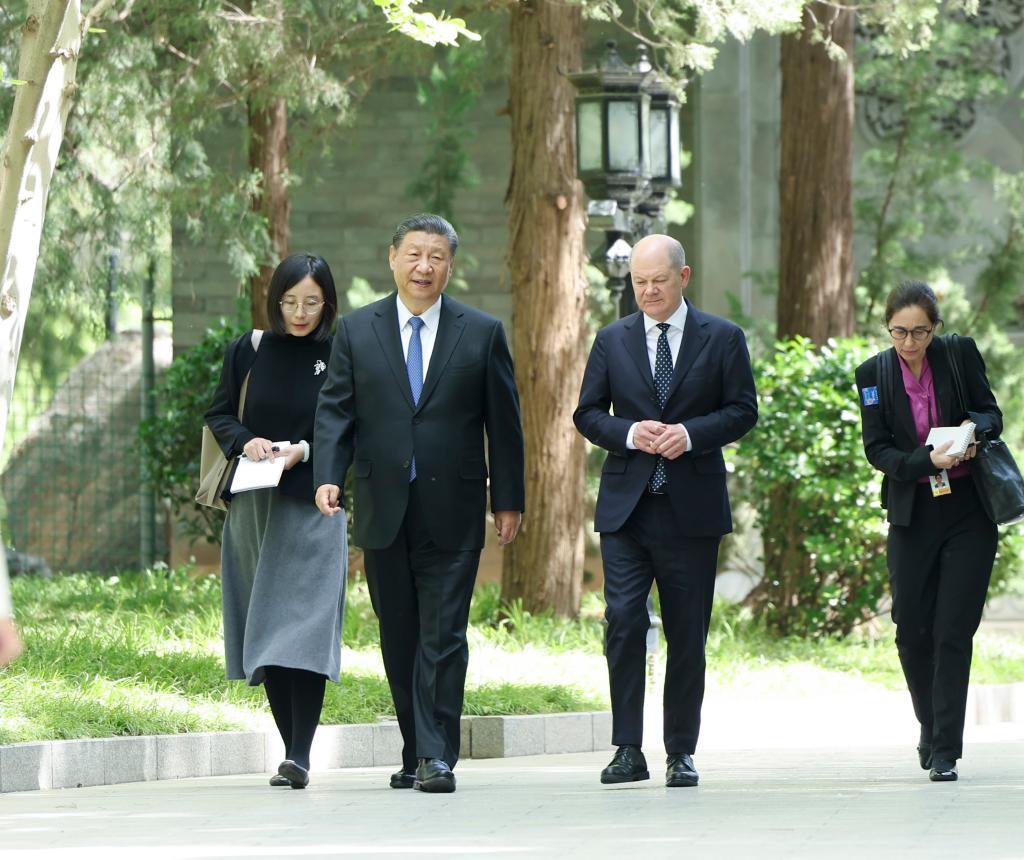
Chinese President Xi Jinping and German Chancellor Olaf Scholz take a walk in Beijing, capital of China, April 16, 2024. Xi met with German Chancellor Olaf Scholz at the Diaoyutai State Guesthouse in Beijing on Tuesday. (Xinhua/Ding Haitao)
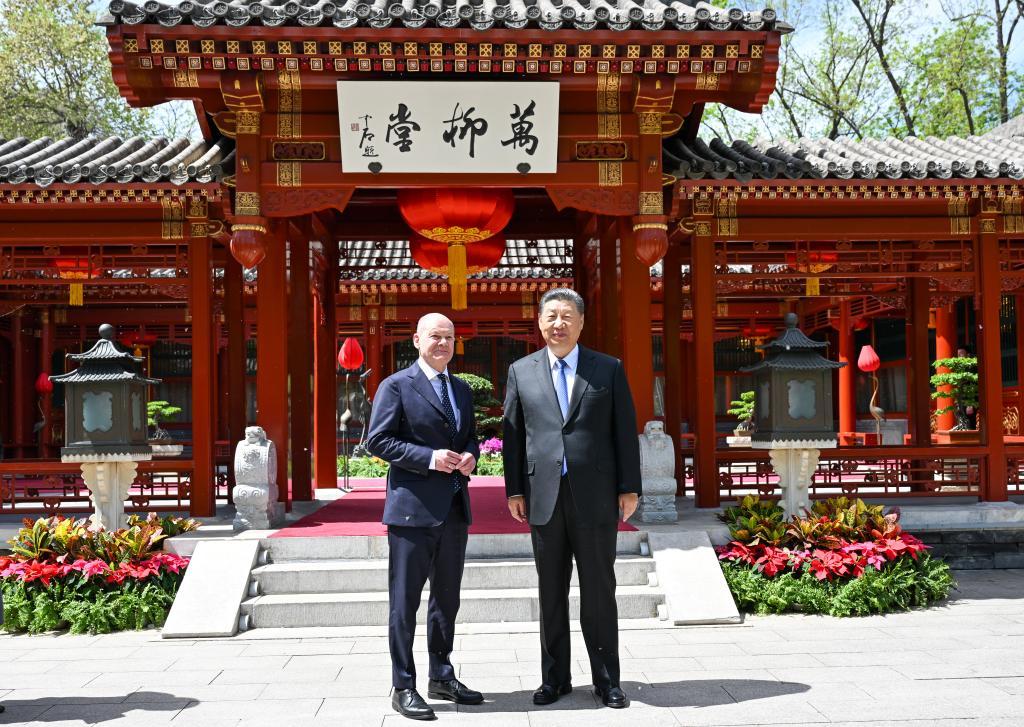
Chinese President Xi Jinping and German Chancellor Olaf Scholz pose for a photo in Beijing, capital of China, April 16, 2024. Xi met with German Chancellor Olaf Scholz at the Diaoyutai State Guesthouse in Beijing on Tuesday. (Xinhua/Xie Huanchi)

